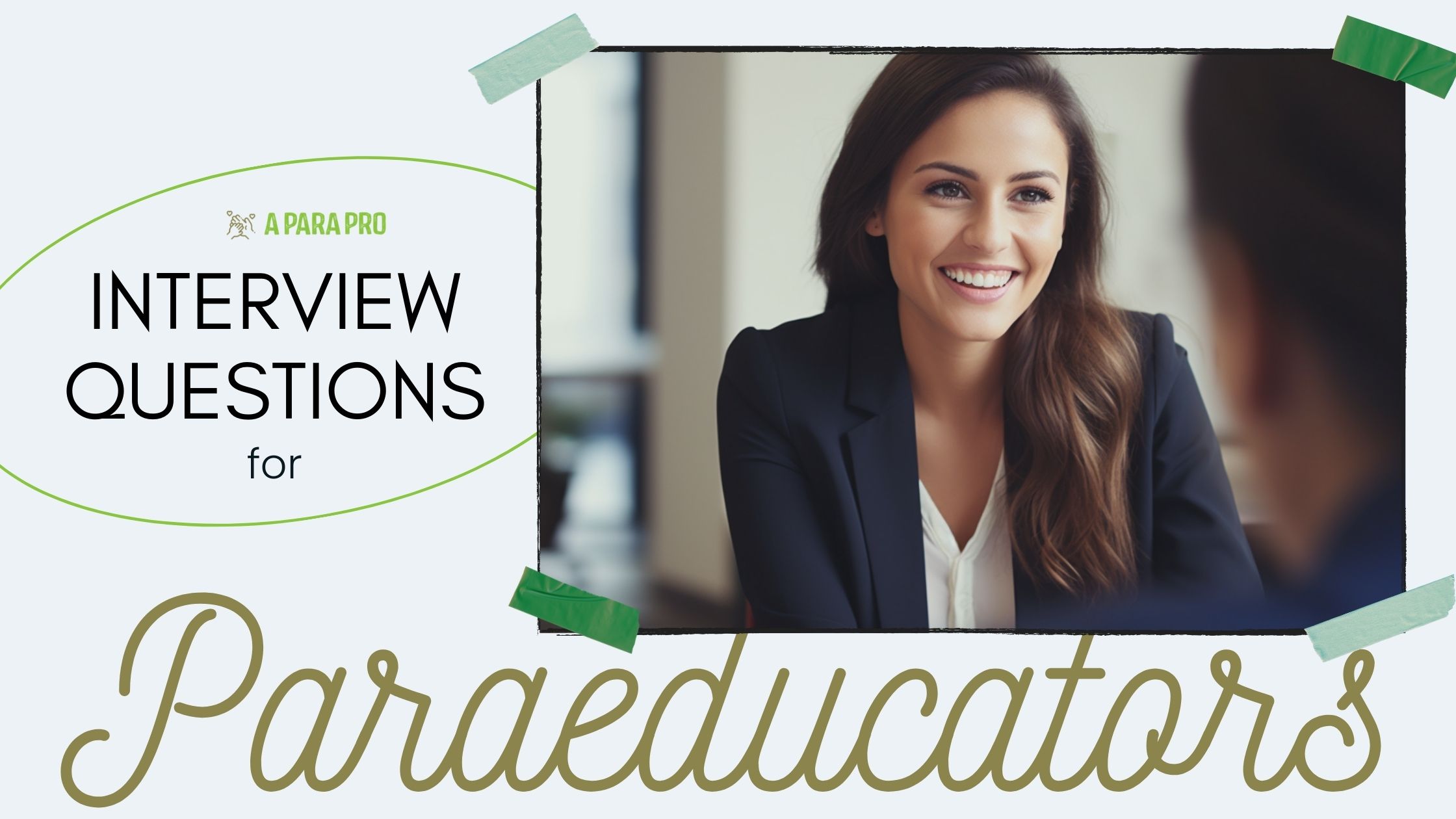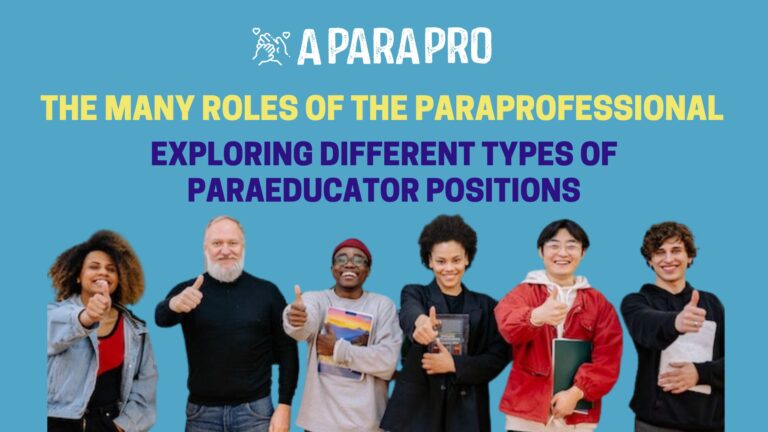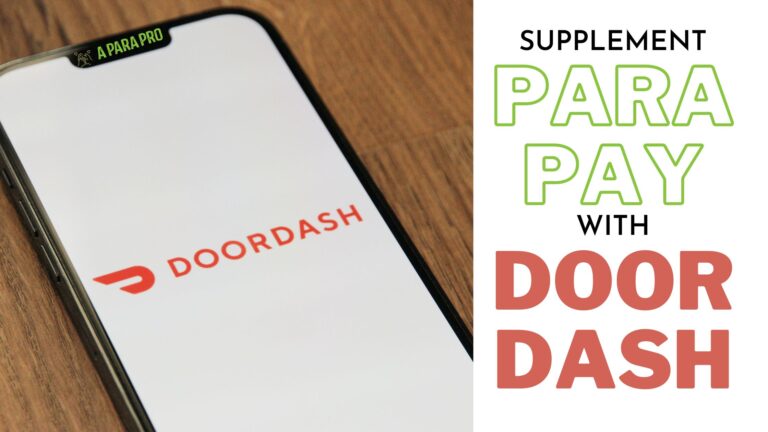Ace Paraeducator Interview Questions: How to Dominate the Interview
Are you preparing for a paraeducator interview? You may be feeling overwhelmed and uncertain as to what to expect. The good news is that with some preparation, you can increase your chances of acing the interview. In this blog post, we'll discuss the top paraeducator interview questions and provide tips on how to respond. Get ready to dominate your next interview!

Answers to Common Questions About Paraeducators to Help You Answer Your Paraeducator Interview Questions
Before we dive in it's important to have a general knowledge of the paraeducator position. Not only will it help you answer interview questions it give you a better understanding and expectations of your role as a paraeducator.
Why should paraeducators train to work with special needs students?
When it comes to working with special needs students, it is crucial that paraeducators receive specialized training. Individuals who are patient, compassionate, and possess a genuine interest in supporting students with diverse needs make excellent candidates for this role. Additionally, those who have a strong understanding of different learning styles, behavior management techniques, and strategies for adapting curriculum are ideal candidates for working with special needs students.
What Qualifications Should a Paraeducator Have?
A paraeducator should have a degree in education or an associate's degree and apply for licensure. In addition, they should have experience working with children. They should also be able to demonstrate knowledge of the job and be able to answer questions about it. If you don't have these qualifications you can also qualify by taking advantage of the short-term para license, which allows you to do the job while working towards your certification. Or lastly, take an exam and apply for certification after you pass.
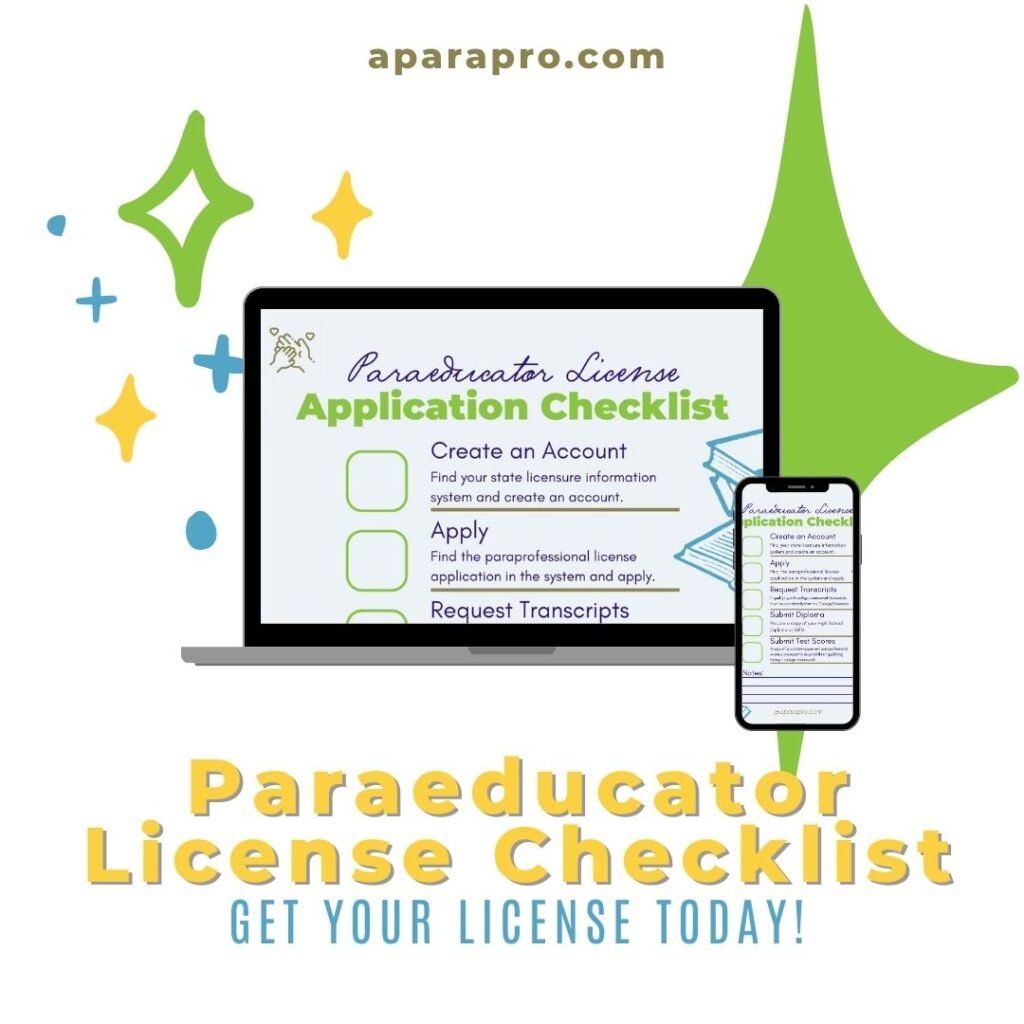
In addition to the educational qualifications, paraeducators should possess excellent communication skills, patience, adaptability, and the ability to work collaboratively with both students and teachers. Some states may also require paraeducators to obtain specific certifications or complete training programs.
What Kind of Experience Should a Paraeducator Have?
There are a few things you should keep in mind when answering common paraeducator interview questions.
- First and foremost, it's important to demonstrate your knowledge of the job.
- Secondly, don't be afraid to answer any questions that are specific to the position you're interviewing for.
- Finally, remember that paraeducators must have a strong working knowledge of education and children. This means being able to discuss topics such as curriculum design, student assessments, and disciplinary procedures.
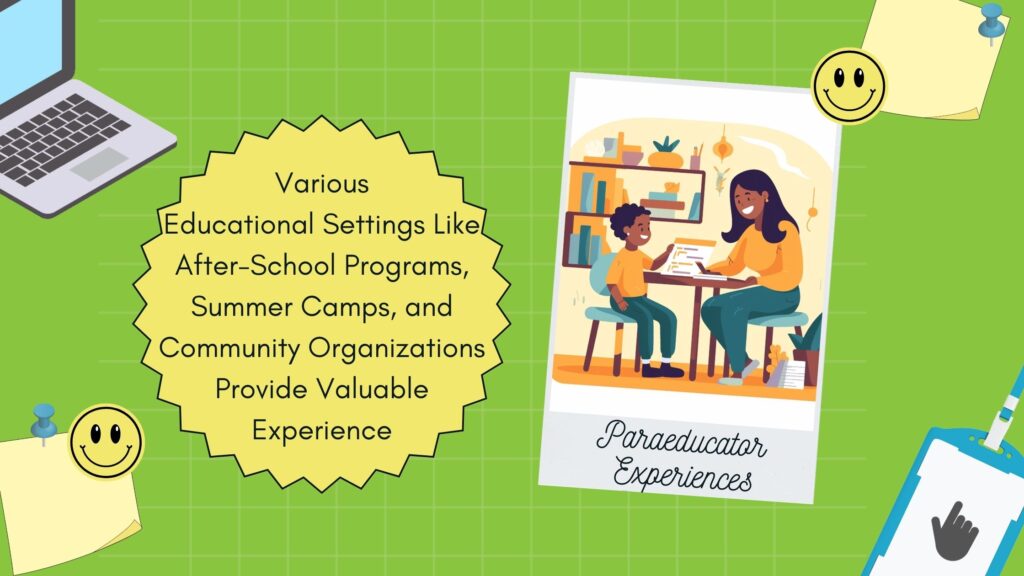
You can find out more about demonstrating your knowledge of the job during the interview by reading our tips on how to answer common paraeducator interview questions further in this blog post.
How can a paraeducator best support students?
A paraeducator can best support students by providing individualized assistance and support in the classroom. This includes helping with academic tasks, facilitating small group activities, and providing one-on-one support to students who may require additional assistance. Building a positive and supportive relationship with students is also crucial, as it helps create a safe and nurturing learning environment. Additionally, paraeducators can collaborate with teachers to implement individualized education plans (IEPs) and support students in achieving their educational goals.
What challenges may a paraeducator face?
Paraeducators may face various challenges in their role. Some common challenges include managing challenging behaviors, adapting instruction to meet the diverse needs of students, and navigating communication barriers. Time management can also be a challenge, as paraeducators often work with multiple students and may need to balance various responsibilities. Additionally, building effective working relationships with both students and teachers, while maintaining professional boundaries, can present its own set of challenges.
How can a paraeducator handle difficult situations?
Handling difficult situations requires a combination of effective communication, problem-solving skills, and maintaining a calm and patient demeanor. Active listening is crucial in understanding and addressing the concerns or challenges at hand. Paraeducators should collaborate with teachers and other professionals to develop strategies and interventions that support students' needs. Additionally, seeking guidance from experienced colleagues or attending professional development workshops can provide valuable insights and techniques for managing difficult situations.
What if a paraeducator is not comfortable working with special needs students?
It's important for paraeducators to recognize their comfort levels and areas of expertise. If a paraeducator feels uncomfortable working with special needs students, it is advisable to communicate their concerns to their supervisor or the appropriate personnel. They can discuss potential training opportunities or alternative roles within the educational setting that align better with their skills and comfort levels. Open and honest communication is key to ensuring that all students receive the support they need while also considering the paraeducator's professional well-being.
Now, Let's Help You Dominate Those Paraeducator Interview Questions

How to Demonstrate Your Knowledge of the Job During the Interview
There are a few things you can do to show your knowledge of the job during an interview.
- First, research the position you will be discussing.
- Second, make sure you prepare to answer questions about the job and the specific qualifications you have for it.
- Finally, make sure you display a genuine interest in the position and the work that will be done.
What Kind of Questions Will I Get Asked During the Interview?
During the interview, you should get asked questions about your paraeducator's experience working with children and their families. You should also be asked about your qualifications, including educational requirements and experience working with children. You can also be asked about your ideal paraeducator job role and how you think you could contribute to their educational program.
Tips for How to Answer Paraeducator Interview Questions
If you're looking for tips on how to ace your paraeducator interview, here are five things to keep in mind.
- First, prepare to answer questions about your experience working with children and adolescents.
- Second, make sure you know the basics of paraeducating – like how to create a positive learning environment for kids.
- Third, show your investment in the job by mentioning specific reasons why you'd want to be a paraeducator.
- Fourth, remember that paraeducators must be able to work independently and also collaborate with other professionals.
- Finally, Practice! It can't hurt!
Answers to Common Paraeducator Interview Questions
Answer: I have a genuine passion for education and a strong desire to make a positive impact on students' lives. I believe that every student deserves equal opportunities to succeed, and I find great fulfillment in supporting their learning and growth.
Answer: I understand that challenging behaviors can arise in the classroom, and my approach is to remain calm, patient, and empathetic. I would first try to understand the underlying cause of the behavior and then implement strategies that promote positive behavior reinforcement and provide appropriate support to the student.
Answer: Collaboration is essential in the educational setting, and I prioritize open and effective communication with teachers and other professionals. I believe in actively participating in team meetings, sharing observations, and providing input to develop and implement strategies that address students' unique needs.
Answer: I recognize the importance of catering to diverse learning styles and abilities. I would adapt instruction and materials to meet individual student needs, use multi-sensory approaches, and provide additional support or accommodations as required. Differentiation is key to ensuring all students can access and engage with the curriculum.
Answer: In a previous role, I encountered a situation where a student was struggling with a particular subject, and the parent was concerned about their progress. I actively listened to the parent's concerns, empathized with their perspective, and collaborated with the teacher to develop a targeted plan to support the student's academic growth. Through ongoing communication and personalized interventions, we were able to address the challenges and witness positive progress.
Answer: Confidentiality and professionalism are paramount in my role. I understand the importance of maintaining student privacy and respecting sensitive information. I adhere to all relevant policies and guidelines, and I prioritize professionalism by maintaining appropriate boundaries, demonstrating respect for students, colleagues, and parents, and maintaining a positive and collaborative attitude.
Answer: Creating a safe and inclusive classroom environment is crucial. I believe in fostering a sense of belonging, respect, and understanding among students. I actively promote diversity and inclusion, address any instances of bullying or discrimination, and encourage open dialogue that celebrates each student's unique background and experiences.
Answer: Multitasking and prioritizing are essential skills in a busy classroom. I stay organized by using tools such as schedules and to-do lists, allowing me to manage my time effectively. I prioritize tasks based on urgency and importance, ensuring that I can provide the necessary support to students while completing administrative duties efficiently.
Answer: I view constructive feedback as an opportunity for growth. I am open to receiving feedback from teachers, administrators, and colleagues and consider it valuable for refining my skills. I actively seek professional development opportunities, attend workshops and training sessions, and continuously seek ways to improve my practice as a paraeducator.
Answer: Building positive relationships with students is foundational to my role. I approach students with empathy, actively listen to their concerns, and show genuine interest in their well-being and success. I provide support and encouragement, celebrate their achievements, and create a safe and inclusive environment where students feel valued and supported.
Remember, these are sample answers that can be personalized based on your own experiences, qualifications, and the specific requirements of the position you're applying for. Use them as a starting point and tailor your responses to showcase your unique strengths and suitability for the role.
Paraeducator Interview Questions to Ask Employers?

- Can you tell me more about the school's philosophy and approach to inclusive education?
- What types of special needs students will I be working with in this role?
- How do you support collaboration and communication between paraeducators and teachers?
- Can you provide examples of how I will be involved in the development and implementation of individualized education plans (IEPs)?
- What professional development opportunities are available for paraeducators in this school?
- How do you foster a positive and inclusive classroom environment for all students?
- Can you describe the support system in place for paraeducators, such as mentorship or supervision?
- What are your expectations for paraeducators in terms of behavior management and classroom discipline?
- How do you encourage collaboration and teamwork between paraeducators and other staff members?
- Can you provide insight into the typical daily responsibilities and duties of a paraeducator in this school?
- How do you ensure that paraeducators are kept informed and up-to-date regarding student progress and any necessary modifications or accommodations?
- Can you tell me about the technology resources and tools available to support paraeducators in their role?
- What strategies does the school employ to foster a positive and inclusive partnership between paraeducators and parents/guardians?
- Can you provide information on the opportunities for professional growth and advancement within the paraeducator role at this school?
- How does the school promote and support a culturally responsive approach to education, and what role do paraeducators play in that process?
Feel free to choose the questions that resonate most with you and the specific educational setting you are interested in.
In Summary
Acing a paraeducator interview requires preparation and confident communication. By clearly understanding the qualifications you should have and being able to demonstrate your knowledge of the job, potential candidates such as yourself can stand out. Asking relevant questions during the interview is also essential in showing that your interest in knowing more about the role and how it fits into the larger school setting. With some careful research and practice, any candidate can prove themselves as an ideal choice for a paraeducator position!
PIN FOR LATER



